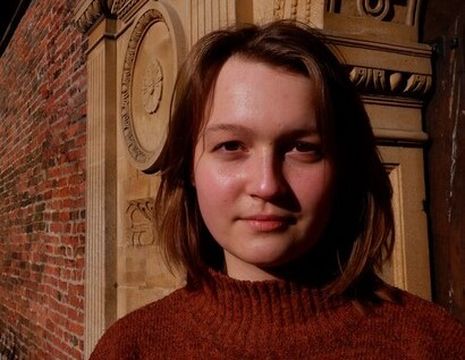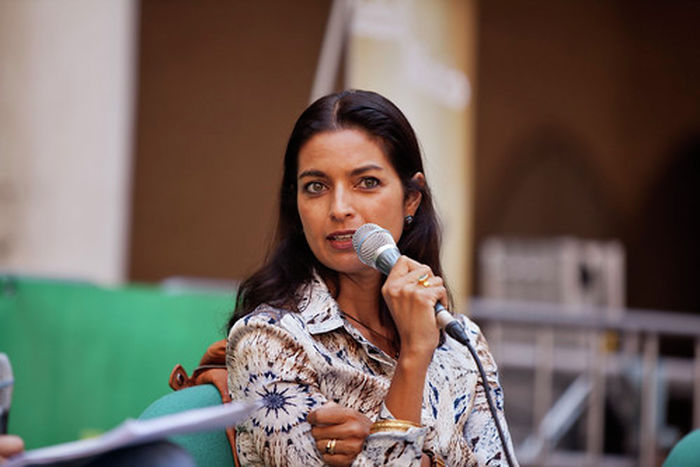‘My favourite thing about the creative scene in Cambridge is that it embraces being cringe’: student poet Nadia Lines
In her second year of university Lines published her debut pamphlet. She talks what inspires her and why people should take student poetry more seriously

Nadia Lines started writing poetry as a teenager “as lots of us do”. And like many of us, she’s been “hooked ever since.” So much so that she has achieved the publication of her debut pamphlet, Stephen the Phlebotomist, in her second year of university.
Published by debut specialist Nine Pens, the pamphlet charts Lines’ tumultuous experience in Michaelmas 2020, and meditates on themes such as youth and queer desire. Though written across the pandemic, she cites this particular time as “the real heart” of her project.
“I was in a household of sixteen people, in tiny, cramped staircases, which basically meant that Covid was uncontrollable. I have OCD, making this one of the most challenging experiences of my life. But I also made some incredible friends ... and the pamphlet explores the unexpected joy of these interactions.”
Along with the likes of Keats and medieval lyricists, Lines cites the people in her life (whether they know it or not) as a critical source of inspiration. “I am lucky to know lots of talented young writers and reading their work always makes me smile. As for my muses, if you’ve ever met me there’s a chance you could end up in a poem! I draw most of my inspiration from the people around me — not just friends or family or partners, but strangers, too.” So what are her hopes for her readership?
My favourite thing about the creative scene in Cambridge is that it absolutely embraces and encourages being a bit cringe
Lines wants people to take student poetry a little more seriously. “I think student poetry has a bad name. It’s accused of being pretentious, shallow, faintly ridiculous. And it can of course be all of these things, and frankly it often is. A lot of my poetry often is. But there’s a place for pretentiousness – we can’t write good poetry unless we have written bad poetry.”
There’s no ‘perfect’ poem, and Lines has found in Cambridge non-judgemental literary spaces to develop her craft and make mistakes freely. “If you can’t do this as a student, when can you? Poetry can be embarrassing and vulnerable and, dare I say it, a bit cringe. But my favourite thing about the creative scene in Cambridge is that it absolutely embraces and encourages being a bit cringe.”
In her writing and open-mic performances, she finds herself empowered by vulnerability and shamelessness. “I’m also a drag king, and what I love about drag is its silliness, irreverence and exuberance. This also makes it a great medium for poetry: you can be unapologetic and unashamed. Drag brings me simple joy — I want to be entertaining and give the audience a good laugh, but I do it mainly because I love it and it makes me feel alive.”
In addition to her drag work, and staging her own production of The York Crucifixion, Nadia is dipping her toes into the world of film. “I wrote a piece called Silent Treatment about a woman who falls in love with a cardboard cut-out of Robert Pattinson, which was screened as part of the Downing Festival of New Writing. I think I am most proud of creative work which manages to merge seriousness, tenderness, and pain with humour.”
I think I am most proud of creative work which manages to merge seriousness, tenderness, and pain with humour
Lines is acutely aware that she’s writing and performing within a culture that is constantly undermining the value of the arts in people’s lives. “We can talk about the UK’s flourishing creative industry, or the fact that culture is what makes us human. We can talk about freedom, beauty, truth and love and all that. But the simple fact is that those who attack English, and the humanities more broadly, do not want people to be able to critically analyse what they read and what they hear. It is insidious and disturbing.”
Reflecting on the relationship between academic study and creative writing, Lines adds: “While I do not think that you have to study English to be a great writer ... the chance to explore how writing works while being exposed to lots of different kinds of literature is a gift.”
This young poet will remain steadfast in her pursuit of all these creative outlets by applying for a Masters in Creative Writing here at Cambridge. “I really want to get better at all kinds of writing — I want to write scripts, screenplays, novels, creative nonfiction, radio dramas. I do love academic work, but I think it will be time to really focus on creative writing when I graduate.”
So what’s Lines planning next? “I’m currently working on a play about the medieval mystic Margery Kempe, and I am slowly, slowly, slowly writing some more poems. I want to write for the rest of my life.”
You can find Nadia’s pamphlet ‘Stephen the Phlebotomist’ here.
 News / Report suggests Cambridge the hardest place to get a first in the country23 January 2026
News / Report suggests Cambridge the hardest place to get a first in the country23 January 2026 Arts / Exploring Cambridge’s modernist architecture20 January 2026
Arts / Exploring Cambridge’s modernist architecture20 January 2026 Comment / The (Dys)functions of student politics at Cambridge19 January 2026
Comment / The (Dys)functions of student politics at Cambridge19 January 2026 Theatre / The ETG’s Comedy of Errors is flawless21 January 2026
Theatre / The ETG’s Comedy of Errors is flawless21 January 2026 News / Write for Varsity this Lent16 January 2026
News / Write for Varsity this Lent16 January 2026











